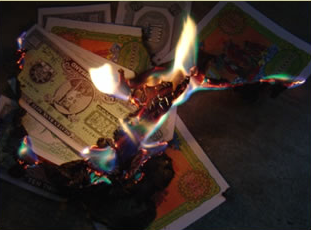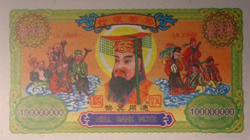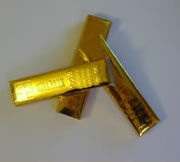| |
Hell
Money
Alex
Adair, Joanne Choi, Ceasor Dennis, Clara Lin, Lambert Yuen

There’s
always a particular smell of burning incense when one walks through the
gates of a Buddhist temple. The smoke looms around in a mist-like form.
The air is difficult to breathe and some of the people’s eyes burn
from the ashes around. The faithful continue to add more to the already
huge amount of incense of all shapes and sizes—the little flames
on the top of the incense glows through the misty smoke. Before these
incense lays the deities, to whom some ask for divine guidance for their
cause.
Today, a girl was burning something else in the temple. I looked down
at what she was burning—some form of paper money? It appeared so.
She was dropping them into the flames one by one. I had seen something
like this before—somewhere in a Chinese movie, a man was dropping
paper money in a makeshift grill for his brother who had died. Curiously,
I approached the girl.
“May I see one of those?” I asked
“Of course,” the woman replied.
I looked at what the paper money said. “Hell money,” it read
on the bottom.
---
The use of
spirit money (also known as hell money or heaven money) in observing different
rituals is deeply rooted in Asian culture. Archaeological evidence of
“fake/spirit money” can be seen as far back as circa 1000
B.C. Imitations of money in the form of stones and bones (along with cowrie
shells) were found in tombs. In the Spring and Autumn periods, archaeologists
have found evidence of imitation metal money. The imitation metal money
was thin and fragile, made of lead and bronze. There were also imitations
in clay of gold plaques. Initially, archaeologists believed that imitations
were for the poor; however, that belief changed when they discovered imitation
money in the tombs of the wealthy
---

“What
is Hell Money?” I asked.
“It’s heaven money. My dad got mad at me for calling it hell
money. Heaven Money is just money you burn so the person can spend it
in the afterlife. It’s regular-shaped bills with faces on them.
They smell like incense, and we burn them.” the girl said. She continued
tossing them into the flames. We continued talking.
“You know any history about Hell Money?” I asked
“I’m not really sure about the history other than that I think
people used to actually burn real money instead of what they burn today
which is just fake or somewhat as just symbolic money. I have no clue;
all I know is that it has been around for a long time.”
“So where did you get this money to burn?”
“I got it from a mortuary or temple place. We bought it from them…You
can also buy them at an Asian supermarket.”
“How much would you say heaven money is worth to you or your family?”
The girl thought it over. “It’s really hard to put a value
to it,” she began, “I personally don’t believe in heaven
money and all the other stuff that goes along with it, but I know it meant
a lot to my Grandma, so I was mainly doing it for her and other members
of my family. All I know is that my mom made me do it, and she told me
the money floated up to heaven to grandma to use to live. I just know
that this kind of stuff can mean a lot to some people, so when I do it,
I just try to remember that.” She was not alone. I talked to three
other people her age—they agreed that it was part of tradition and
not of religious identity—out of respect for their elders rather
than a serious belief that people would go to the afterlife.
---
Spirit
money itself has many different uses; however, it is used generally as
a symbol of transformation, increase in reproduction, and payment of spiritual
debts. The notes used as “money” are transformed to spirit
money when they are used as symbolic offerings to ghosts, gods, and ancestors.
The burning of spirit money allows for it to be transferred to ghosts,
gods, and ancestors to be used as real currency in the other world. Furthermore,
spirit money serves a vital role in association with the offering of food
to some ghosts, gods, and ancestors. The offering of food serves to bring
our ancestors and other beings in the other world closer to us. It serves
as a bonding tool to bring both worlds together. This can be seen in cultures
all around the world where feasts, dinners, and other social events use
money to bring the community together. Spirit money on the other hand
serves to separate the living world from the world of ghosts, gods, and
ancestors. It is not natural to have both of these worlds in close connection
with each other. The use of spirit money is very similar to how we use
money in our society today. It is generally used as a tool to maintain
a certain level of distance between two parties during a transaction.
The concepts of food and money correlate directly to the offerings to
ghosts, gods, and ancestors. We use food to bring them close to us and
money to separate them from us.

---
“So you just burn it? There’s no other use?”
She smiled a little. “No. We only use paper money for burning. We
use real money (the American dollar) on an altar or Buddha.” The
girl meant a tradition to put real money (or money that the living used)
on an altar or a Buddha statue for blessings and good fortune.
At this point, another woman came into my view. She was a lot older, perhaps
the girl’s mother. The mother spoke quickly to the girl in Vietnamese,
pointing at me, and girl spoke back to her in Vietnamese. Although I did
not understand, I was sure she was asking about who I was and what was
my business with the girl.
Then the girl turned back to me. “This is my mother” she said
calmly.
“Hey, I’m sorry, am I interrupting anything?” I quickly
suggested
“Hello. No, not at all,” was her reply.
“Do you mind me asking a few questions about this hell money?”
I needed a perspective one generation older on hell money. At this point,
I turned my attention on the mother.
---
Spirit money is used in many differing activities. For example, the critical
role of spirit money is to repay the debts of our ancestors. The spirit
of the ancestor must obtain a body and a fate to pursue it karmic course.
However, in order for it to do so, it must pay its mystical debt that
accumulates over a person’s life. According to McCreery, “It
is, however, the burning of large quantities of spirit money that makes
the difference in how severely a person is punished when, having died;
he once again faces the courts of Hell. This rationale explains why people
burn such large amounts of spirit money at funerals, for no one ever complete
succeeds in repaying his celestial debt. His descendants must pay for
him.” (p.5). The living person attempts to pay off this debt by
praying and making monetary donations to the gods and temples. However,
no one pays off their debts entirely while alive, so their remaining family
burns spirit money which is transmitted to their deceased family member.
The deceased family member uses this money to pay down the remainder of
his debt and embarks on his karmic journey.
---

“I’ve been burning money since I was a kid. My mom told me
it was for my grandmother in heaven. I was very young, maybe twelve? My
parents explained what it was and how when I burn it, it will help…in
the afterlife. I remember my mom giving me a bunch of the money and told
me to throw it into the flame in the grill, like a bbq grill. I threw
the money into it a big cylinder, heavy, and made of metal or something
like that. We put that outside the house, and that is where my parents
burned the paper money and paper clothes. Inside the house we have the
altar where we burn incense, and pray to the dead. They burned the paper
clothing and money after the incense finished burning. Since then I have
only done this a couple of times, and have not done it recently.”
I quickly wrote it down on my notepad. “I see. So you would consider
this more of a religious act rather than a cultural or ethnic group thing?”
I asked.
“Burning money, I think, is mostly religious. It falls more under
religious than the other groups, but it can be somewhat of a cultural
thing also.”
“And what do you think your daughter thinks?” I asked.
“I’m not sure, right now it does not seem that way. She has
never participated in the actual burning of it before but she does know
what it is.” The mother replied. “I know that my daughter
doesn’t really believe in it the same way as my parents do or how
my grandparents used to. I think living in America has somewhat changed
the way my daughter looks at things like this.”
“You know any history about it?” I inquired.
“I do not know how long people have been doing this. All I know
is that I have done the same thing my parents and their parents did before.
Ages ago, generations and past lives ago. We burn the paper money for
the dead, and the smoke floats on to the dead people and the dead use
the money in their afterlife.
“Then we pray for the dead person to give us good luck, and good
health. We burn paper money, and paper clothes on the anniversary of the
death of the dead person. I do know now that they have different stuff
you can burn now. We also have paper gold, and clothes. We use this to
give to the dead when we pray for them. I’ve even heard about fake
credit cards you can burn also.”
---
Spirit money is also used in activities outside of funerals. Spirit money
can used to cast away foul spirits that interrupt offerings to the gods
or ancestors and create problems in one’s life. This type of ritual
is performed by hoat-su. These are specialists in performing rituals for
clients who seek their help with illness or other personal problems (p.
8). The hoat-su writes, Heaven and Earth, the Lord of Thunder, and all
the gods of China’s three religions command with all their power
the god of the year and the gods of the months and hours to dispel whatever
evil powers threaten here, on a paper charms in order to expel the evil
spirits. The hoat-su then stamps the charm, burns it, dissolves the ashes
in a cup of water, sips water, and spurts it out. Spirit money can also
be used as a bribe to keep ghosts away. Burning spirit money serves as
purification which separates the living from spirits
---
Now I knew about physical part. “Ok,” I asked, “can
you tell me more about what you believe in?”
“When you burn the money it goes to the dead relative in the afterlife.
They use the money to buy like a Prada suit or something, and in return
for your good work, they give us good fortune, and their blessings. So,
we do it to get good fortune. I think people have been burning money for
a long time, ever since I can remember.
“We only burn out of consideration for our family. The money is
almost like real money. We cannot use, but they can use. It is real important,
and has a lot of value. If they died old and naturally, they go to heaven
or hell depending on their actions in life. But, we can still give them
money and things as if they were still alive. They are like real people,
just not right here with us, and they use different money.
“If a person died unexpectedly, or untimely, they do not go to heaven
or hell, but go in between. I do not know where, but it is a place in
between, because they did not live long enough to determine how good they
were, or who bad they were. And even though they are in this middle place,
they can still receive gifts from us like normal people. Right, it does
not matter where they go, or what happened to them, the dead can still
receive gifts as if they were still alive.”
It was time to go. I walked with them out of the temple and to their car.
The slight breeze made the air more refreshing, as I asked the girl and
her mother if they had any last words before I ended the interview.
The mother went first. “I just know that the money is supposed to
help my family members in the afterlife and that is important to me. I
think my family values it a great deal especially my parents who still
burn the money on the anniversary of their parents’ death. It is
the thought of giving for our dead. It does not matter what they are,
Chinese or whatever, it is important to people who burn the paper money
for the dead.”
The girl went last. “I think the “heaven money,” makes
everybody who uses it feel better about the people who have died and it
shows that we still care and think about them. I guess its part of tradition
and their religion, that’s why this money is important to them.”
Works Cited
Gates, Hill. “Money for the Gods.” Modern China 13.3 (1987):
259-277.
McCreery,
John. “Why Don’t We See Some Real Money Here?: Offerings in
Chinese Religion.” Journal of Chinese Religions 18 (1990): 1-24.
|
|